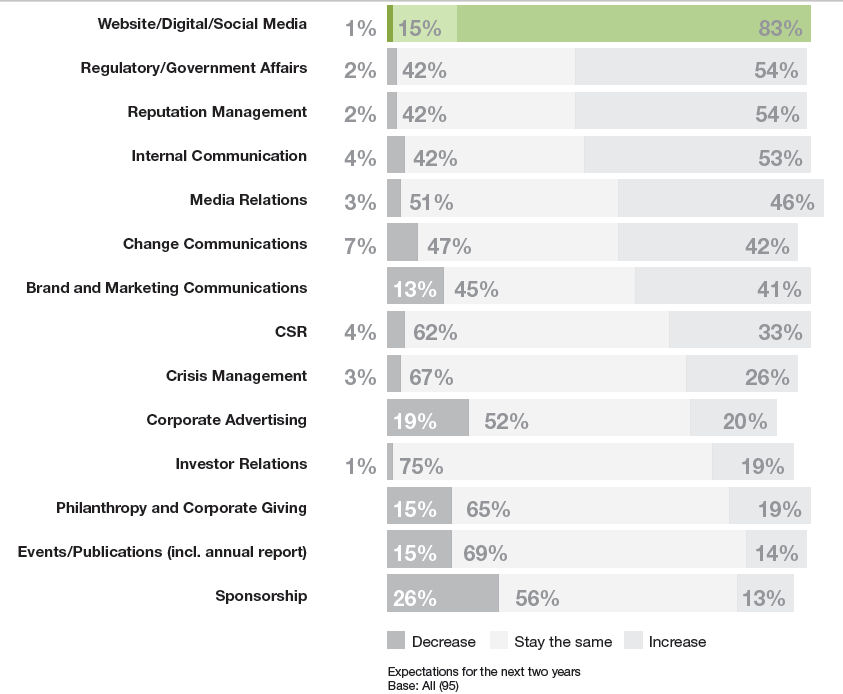The Business Leaders in Communications Study 2012 commissioned by VMA Group, surveyed 95 directors of communications in leading FTSE organisations about their corporate communications function. The research highlighted changes that directors are expecting to see in their role in the next two years. The service that they expect a grow in demand for the most is digital media, including social media (83 per cent of recipients expect an increase in demand).
Q: For each type, please indicate how you think demand for resources within your organisation will change in the next two years.

Source: The Business Leaders in Communications Study 2012
However, despite this huge growth in demand, only 15 per cent of directors think it is critical to recruit specialists to meet it. Julia Meighan, executive chairman of VMA Group, thinks that it is a “huge mistake” not to be taking on more communications professionals who understand the importance of social media strategies: “In my opinion organisations are not investing sufficiently for the size of the task or at the right level. Many companies are proud to announce they have one or two young technical savvy whizz kids in their social media team and are then likely to carry on with ‘business as usual’ in the communications function at a strategic level".
Meighan says that communications leaders and their executive boards need to recognise that social media and its strategic use should sit at the heart of improving and managing corporate reputation. She adds that it is not just technical skills that are required: “What is essential is having seasoned communications professionals that have the foresight and understanding to implement social media for its strategic and business opportunities. Technology has changed the way we behave and so too must communicators’ responses.”
To further underline the importance of social media knowhow, the study showed that the impact of social media on managing reputation is considered to be one of the top three challenges for communications directors in the next two years. Meighan believes it is obvious why this is such test, as social media has lessened control over messaging for communicators, “and even the most well-resourced teams are unlikely to be able to monitor every issue that is raised or discussed via social media channels".
Q: Please select from this list the three most important challenges for communications in your organisation over the next two years.
Source: The Business Leaders in Communications Study 2012
Giving an example of how social media can backfire, Meighan mentions a well-known restaurant chain that bought two promoted Tweets, which it hoped would encourage happy customers to share their stories. Instead, she says, “the company was inundated with claims of poor service and bad food. Not just a huge PR challenge then, but clear support for the view that social media works and behaves very differently and cannot be controlled in the way that traditional PR campaigns could be managed.”
Methodology
The Business Leaders in Communications Study 2012, commissioned by VMA Group, spoke to 95 directors of communications in leading FTSE organisations about their corporate communications function. Participants included: BP, GlaxoSmithKline, PWC, IHG, Hammerson and Rolls Royce AMEC plc, AstraZeneca, Aviva, BT, Deutsche Bank, Diageo plc, GlaxoSmithKline, The John Lewis Partnership, Lloyds Banking Group, McKinsey and Company, Novartis and PwC. The research was designed, hosted and managed by Mediatrack Research.
The Business Leaders in Communications Study 2012 is available from the BLCS web page here.
PR Masterclass: The Intersection of PR and GEO
Join PRmoment for a Masterclass featuring 10 of the industry’s foremost experts. You will walk away with a clear, actionable strategy for adapting your content to an AI-first search environment.
Taking place on Wednesday 25th February in London, both virtual and in person tickets are available.
Early bird ticket sale ends Friday 9 January.
PR MasterclassIf you enjoyed this article, sign up for free to our twice weekly editorial alert.
We have six email alerts in total - covering ESG, internal comms, PR jobs and events. Enter your email address below to find out more:









